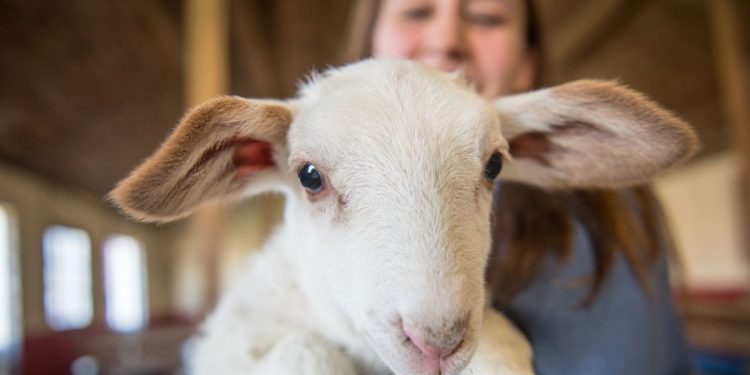Editors note, August 2, 2022: This piece was originally published in February 2022 and updated on August 2.
Last week, celebrity chef Gordon Ramsay posted a TikTok video of himself climbing into a pen of lambs, saying, “I’m going to eat you!” He rubbed his hands together while saying “Yummy, yum, yum, yum” and asked, “Which one’s going in the oven first?” He pointed at one lamb, said, “You,” and then exclaimed that it was “over time.”
The cheeky video elicited plenty of laugh-cry emojis and comments from fans on the joke (in 2006, Ramsay asked a contestant on his “Hell’s Kitchen” TV show for lamb sauce, which became a meme). But many commenters were also disturbed, saying the video was sad, that Ramsay had lost it, or that they had lost respect for Ramsay because of his seeming callousness toward cute little lambs.
The video and the reactions it sparked are a stark example of what psychologists have dubbed “the meat paradox”: the mental dissonance caused by our empathy for animals and our desire to eat them.
Australian psychologists Steve Loughnan, Nick Haslam, and Brock Bastian coined the term in 2010, defining it as the “psychological conflict between people’s dietary preference for meat and their moral response to animal suffering.” We empathize with animals — after all, we are animals ourselves — but we’re also hardwired to seek calorie-dense, energy-rich foods. And for most of human history, that meant meat.
When faced with that dissonance, we try to resolve it in several ways. We downplay animals’ sentience or make light of their slaughter (as Ramsay did), we misreport our eating habits (or dismiss personal responsibility altogether), or we judge others’ behavior to claim the moral high ground, as some of Ramsay’s commenters did (even if they likely eat meat themselves).
But the meat paradox doesn’t just flare up when it’s at play in pop culture; it’s a feature of our everyday lives, whether or not we pay any mind to it.
Almost one in four American adults tells pollsters they’re cutting back on their meat intake — while the country sets new records for per capita meat consumption. We abhor the treatment of animals on factory farms, where 99 percent of meat in the US is produced, yet we dislike vegans. And even those of us who say we’re vegetarian or vegan are often stretching the truth.
The meat paradox is also the subject and title of a recent book by Rob Percival, head of food policy at the Soil Association, a UK-based nonprofit that advocates for organic farming practices, higher animal welfare, and lower meat consumption.
I wanted to speak to Percival because he is a walking embodiment of the meat paradox. He spends his days campaigning against industrialized animal agriculture while insisting animals should still play a role in our farming and food system, albeit a much smaller and more humane one.
Percival is quite sympathetic to the vegan cause, going so far as to call animal slaughter “murder,” but isn’t a vegan himself and doesn’t hesitate to criticize the vegan movement’s eccentricities and exaggerations. And he’s gravely worried about what will happen to the world if humanity can’t figure out how to resolve the meat paradox. The West’s meat-heavy diet is a major accelerant to the climate crisis that shows little sign of slowing, and that diet is already being exported to the rest of the world.
So to unravel the meat paradox, Percival talked to farmers, anthropologists, psychologists, and activists to better understand humanity’s messy, complicated, and millennia-deep relationship to the animals we hunt and farm for food.
Read Also: Discover Your Perfect Bully Breed Companion
The meat paradox in ourselves
Percival found that the meat paradox isn’t just a product of modern-day industrialized animal farming, but a psychological struggle that goes back to our earliest ancestors. Those animal carvings and cave paintings made tens of thousands of years ago? They may be more than mere caveman doodles.
“It’s partly speculative, but the case has been made by various scholars that these provide evidence of a ritual response to animal consumption which may well have been rooted in those dissonant emotions, that conflicted ethical sense,” Percival said. “There’s a profound moral dilemma posed by the killing and consumption of animal persons.”
But the meat paradox has intensified in the modern age. One of the founding studies of the meat paradox literature, Percival told me, was the one published by the psychologists Loughnan, Haslam, and Bastian in 2010. They gave questionnaires to two groups, and while the subjects filled in answers, one group was given cashews to snack on while the other group was given beef jerky. The surveys asked participants to rate the sentience and intelligence of cows and their moral concern for a variety of animals, such as dogs, chickens, and chimpanzees.
The participants who ate the beef jerky rated cows less sentient and less mindful — and extended their circle of moral concern to fewer animals — than the group that ate the cashews.
“The act of thinking about a cow’s mental capabilities while eating a cow had created these dissonant emotions beneath the surface, which had skewed their perception in really important ways,” Percival said.
Even exposure to strict vegetarians or vegans can elicit a “heightened commitment to pro-meat justifications,” Percival says about one study. This might explain why we see per capita meat consumption rise in tandem with rates of veganism and vegetarianism.
One of the funnier and more telling passages of the book details a meeting Percival had with Charles Way, the head of food quality assurance for KFC in the UK and Ireland. After Way tells Percival how proud he is of KFC’s animal welfare standards, Percival asks Way, “If you knew that you were going to be reborn as a chicken, would you prefer to be born onto a farm in KFC’s supply chain, more than on any other farm in the UK?”
Way asserts the company’s standards are above the industry norm (which isn’t saying much), but then says it wouldn’t make a difference, “so no.” Percival tries again: “If you knew that you were going to be reborn as a chicken, do you think you would eat less chicken?”
By Percival’s telling, Way simply doesn’t reply.
When confronted with these dissonant emotions through reports on the harsh reality of factory farming, we try to deny them, dissociating the meat on our plate from the animal that produced it, and in doing so, denying animals of their sentience and intelligence.
We make myths to justify our relationship with animals, too. One of the more popular ones is the “ancient contract,” which goes something like this: Animals give us their meat, and in exchange, we give them domestication and thus an opportunity to evolutionarily succeed. This concept was coined by science writer Stephen Budiansky in 1989 and has been touted by food writers Michael Pollan and Barry Estabrook, as well as iconic animal welfare scientist Temple Grandin.
Pollan and Estabrook don’t condone modern-day industrial animal farming, and Estabrook says it’s a violation of this ancient contract. However, “there is a glaring deceit at the heart of our ancient contract,” Percival writes: “No individual animal has consented to the terms of the deal.”
We also use language to obscure; one study found that replacing “slaughtering” or “killing” with “harvesting” reduced dissonance and that replacing “beef” and “pork” on restaurant menus with “cow” and “pig” generated more empathy for animals. Adding a photo of an animal next to the dish further elevated empathy, while also making vegetarian dishes more appealing to study participants.
Percival says the meat paradox can be found across cultures and periods, and that “there is no culture in which plant foods are problematic in the same way.”
The meat paradox in our institutions
The meat paradox is just as active in our institutions as in ourselves.
Percival’s book opens with a tour of the Natural History Museum of London, where exhibits tell the story of animals’ habitat loss and the effects of climate change on wildlife. But then when you visit the museum’s restaurant, “you might be served food which directly contributed to all those crises,” Percival said. (Meat production is a leading cause of habitat loss, as large swaths of forest are cleared to grow soy and other crops to feed farmed animals.)
Eventually, the museum changed up its menu — offering plant-based dishes, higher-welfare meat, and organic foods — after a pressure campaign from Percival.
That story had a happy ending, but I worry the meat paradox will only harden in ourselves and our institutions as meat becomes more grist for the culture war, as when some Republicans freaked out over a made-up story that the Green New Deal would result in a “burger ban.” To overcome that, Percival argues, we need to stake out a middle ground in the meat debate.
“We need progressive farmers and omnivores to be trying to defuse the tensions with vegans and animal activists, and we need the vegans who say, ‘Okay, step one is let’s phase out the industrial systems and focus on higher animal welfare,’” he told me. “And if you can get a large enough demographic to claim that middle ground, then we might see some progress.”
The middle ground is a hard place to be in an increasingly polarized world. But there are signs of progress: Whenever voters are given the choice to ban cages for hens or pigs, they vote yes, and plant-based meat has gone mainstream in recent years.
And since more bold regulation, like a meat tax, would be politically toxic right now, the change has to start with us.
“I’m not of the view that individuals can fix all this on their own or that it’s the sole responsibility of consumers to fix the food system,” Percival said. “But at the same time, I am of the view that our own choices are influential. They help set social norms. And you need that sort of mass mobilization before the political change becomes viable before you can force businesses to change.”
And to get there, we first need to reflect upon the meat paradox within ourselves, which would allow us, he said, to “see our sort of complicity and entanglements in all this and understand what it might mean to begin to disentangle ourselves.”
Changing how we eat is one of the most effective actions we can take for the climate, but it’s also one of the most personal, as evidenced by the deep-seated influence of the meat paradox. But freeing ourselves from its dissonance really could help us claw our way out of some of the crises we find ourselves in — if we’re willing to confront them.
Source by www.vox.com















































